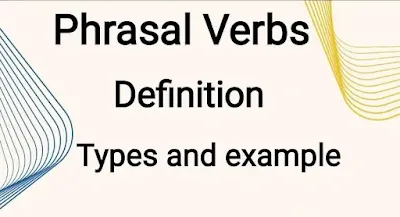Phrasal Verbs definition, types & example
What is Phrasal verbs?
Phrasal verbs are verbs that are made up of a base verb and one or more particles. Phrasal verbs are a unique feature of the English language and can be challenging for non-native speakers to understand and use correctly. They are formed by combining a base verb with one or more particles, which can be prepositions or adverbs. These particles can change the meaning of the base verb in various ways.
For example, the base verb "turn" can be combined with the particle "off" to form the phrasal verb "turn off," which means to stop or deactivate something. Another example is "run out" which means to exhaust or use up all of something.
In some cases, the meaning of a phrasal verb is not immediately clear from the individual words that make it up. For example, the verb "look" when combined with "up" forms "look up" which means to search for information in a reference book or online.
Phrasal verbs can also be separable or inseparable. Separable phrasal verbs allow the object to be placed between the base verb and the particle, and inseparable phrasal verbs have the object after the particle. For example, "turn off the TV" is a separable verb, while "look up the word" is inseparable.
Features of Phrasal Verb
Phrasal verbs are a type of multi-word verb that consist of a base verb and one or more particles. They can have a variety of meanings and can be used in a variety of grammatical constructions. Some common features of phrasal verbs include:
- They can be separable or inseparable, meaning that the particles can be placed before or after the object of the verb, or they cannot be separated from the verb.
- They can have multiple meanings depending on the context in which they are used.
- They can indicate direction, such as "put up" meaning to raise something or "put down" meaning to lower something.
- They can indicate a change of state, such as "turn off" meaning to stop or "turn on" meaning to start.
- They can indicate an action that is done to someone or something, such as "pick up" meaning to lift or "call off" meaning to cancel.
Types of phrasal verbs
There are several types of phrasal verbs, each with a different grammatical structure and meaning. Some of the most common types include:
Intransitive phrasal verbs: These verbs do not take an object. They are usually formed with adverb particles, such as "come in," "go out," "sit down," "stand up," etc.
Transitive separable phrasal verbs: These verbs take an object and the object can be placed between the base verb and the particle. Examples include "turn off the lights," "pick up the book," "put on the clothes," etc.
Transitive inseparable phrasal verbs: These verbs take an object, but the object cannot be placed between the base verb and the particle. Examples include "look up the word," "run out of gas," "find out the answer," etc.
Particle-verb-particle phrasal verbs: These verbs have two particles and are often idiomatic. Examples include "give up on," "put up with," "get over," etc.
Phrasal-prepositional verbs: These verbs are formed by combining a base verb with a preposition. Examples include "depend on," "believe in," "insist on," etc.
Example of Phrasal Verb
Act
1. Act for (পক্ষে কাজ করা): A lawyer acts for his client.
2. Act on (পালন করা- carry out): I acted on my brother's advice.
3. Act upon (প্রভাবিত করা): Over eating acts upon our health.
4. Act upon ( অনুসারে কার্য করা) He acts upon my suggestion.
5. Act upon (নির্ভর করা): Acting upon the information the police raided the hostel.
6. Act upto (পূর্ণ করা) The computer does not act upto our expectation.
7. Act from (কোন উদ্দেশ্য নিয়ে কাজ করা): We should act from a sense of duty.
8. Act under (আদেশ মেনে নিয়ে কাজ করা): The supporters acted under the orders of their leader.
9. Act Against (বিরুদ্ধে কাজ করা): The officer acted against the interest of the company.
Bear
1. Bear away (win, জয় লাভ করা )8 He bore away the prize.
2. Bear down (দমন করা) The government bore down the sedition.
3. Bear off (প্রতিযোগিতায় জয়লাভ করা): He bore off the prize.
4. Bear out (confirm সমর্থন করা): His evidence does not bear out charge against you.
5. Bear up (সহ্য করা): I can not bear up such an insult.
6. Bear up against (বল প্রয়োগ বা দুঃখ-কষ্ট সহ্য করা): The poor are to bear up against all miseries.
7. Bear up on (প্রাসঙ্গিক হাওয়া): The point has no bearing up on the matter under discussion.
8. Bear with (সহ্য করা): I can not bear with such conduct.
9. Bear up (অটল থাকা): Honesty bore him up in rainy days.
10. Bear on (প্রভাবিত করা): The character and behaviour of parents bear on their children.
In summary, Phrasal verbs are made up of a base verb and one or more particles, they can change the meaning of the base verb in various ways and can be challenging for non-native speakers to understand and use correctly. It's also worth noting that some phrasal verbs can function as different types depending on the context.



